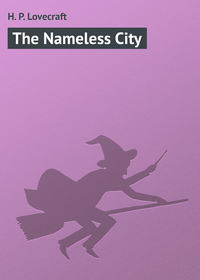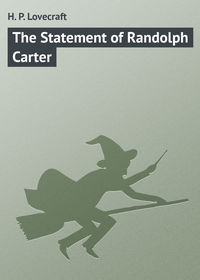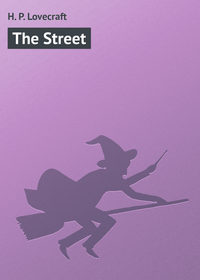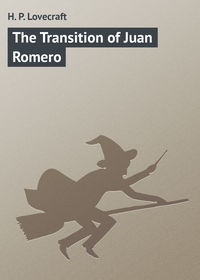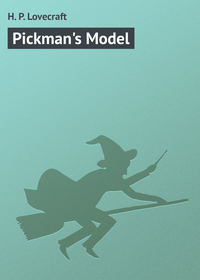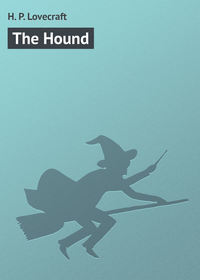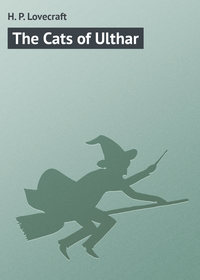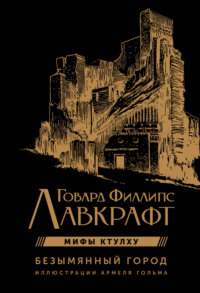
Полная версия
The Haunter of the Dark and Other Tales

H. P. Lovecraft Omnibus
3
The Haunter of the Dark and Other Tales
H. P. Lovecraft

Table of Contents
Cover Page
Title Page
An Introduction To H. P. Lovecraft
The Outsider
The Rats in the Walls
Pickman’s Model
The Call of Cthulhu
The Dunwich Horror
The Whisperer in Darkness
The Colour Out of Space
The Haunter of the Dark
The Thing on the Doorstep
The Music of Erich Zann
The Lurking Fear
The Picture in the House
The Shadow Over Innsmouth
The Shadow Out of Time
Copyright Acknowledgements
About the Author
By the same Author
Copyright
About the Publisher
An Introduction To H. P. Lovecraft
Despite the work of such writers as Edgar Allan Poe, Nathaniel Hawthorne, and Ambrose Bierce, America has no macabre tradition in its literature. Poe and Bierce almost alone produced a considerable body of writing in the genre; Edith Wharton, Henry James, Mary E. Wilkins-Freeman, Robert W. Chambers and a handful of others who wrote in the domain of fantasy are associated primarily with writing that is not macabre. There is not in America a collection of prose in the genre of the fantastic comparable to that produced in England by such masters as Arthur Machen, Walter de la Mare, Algernon Blackwood, Lord Dunsany, M. R. James, E. F. Benson, May Sinclair, Marjorie Bowen, A. E. Coppard, John Collier, H. R. Wakefield, Lady Cynthia Asquith, Thomas Burke, L. P. Hartley, John Metcalfe, Margery Lawrence, and others.
It is therefore all the more interesting to note that a new generation of writers in America has turned consistently towards fantasy as a medium of creative expression. Perhaps it was the lack of any adequate outlet which dampened the ardour of prospective writers before our own time; certainly American magazines and book publishers have long been aloofly cool towards prose and poetry of the supernatural or bizarre. But with the establishment in 1923 of the magazine Weird Tales, interest in fantasy received a new impetus, and there came into modest prominence a group of writers including Clark Ashton Smith, the Reverend Henry S. Whitehead, Frank Belknap Long, Carl Jacobi, Robert Bloch, Ray Bradbury, and, surely at the head of the list, the late H. P. Lovecraft.
Howard Phillips Lovecraft, who died at forty-seven in 1937, was a native of Providence, Rhode Island, where he was a devoted student of the antiquities of that city and, perhaps by natural inclination grown from his ancestry, throughout his life a pronounced Anglophile. He led a sheltered early life, since his health was uncertain, and his semi-invalidism enabled him to read omnivorously, as a result of which the sensitive, dreamy child he was early created a strange world of his own, peopled by the creatures of his fancy. Out of this world subsequently grew much of his fiction in the realm of the supernatural.
Lovecraft was a shy child; he was a retiring, almost reclusive adult much given to haunting the hours of the night. He was tall and thin, and usually almost spectrally pale, though his eyes were bright and very much alive. His jaw protruded, but his character was gentle. In his conversation, his vocabulary was revealed to be of astonishing range and instant application; his fiction, too, gives evidence of his range.
In the scarcely two decades of his writing life, Lovecraft became a master of the macabre who had no contemporary peer in America. He began to write early in life, but did not achieve publication in any national magazine until he was in his twenties. Of British ancestry, his literary influences, too, were British – Arthur Machen and Lord Dunsany particularly – rather than American in the Gothic tradition of Poe, though at least one of his stories, The Outsider, might very well have been written by Poe.
Lovecraft was never widely published, and during his lifetime only one slender book appeared, a novelette printed and bound by an amateur but enthusiastic publisher. Some fifty of his stories appeared in magazines, principally Weird Tales, Amazing Stories, and Astounding Science-Fiction. He was anthologized in his native country and in England, but it was not until two years after his death that an omnibus volume containing his best prose was published by Arkham House under the title of The Outsider and Others, a book which has since become one of the most prized collector’s items in America. This volume was followed by Beyond the Wall of Sleep, Marginalia, The Lurker at the Threshold (a novel finished by August Derleth), and Something About Cats and Other Pieces, all containing lesser work.
Though his early work was more especially fantastic, influenced by Lord Dunsany, Lovecraft soon turned to themes of cosmic terror and spiritual horror in such remarkable tales as The Colour Out of Space, The Dunwich Horror, The Whisperer in Darkness, and others, among them that unique and memorable horror-tale, The Rats in the Walls, quite possibly the best of its kind written in America since 1900. Soon after his stories began to appear in the magazines, the pattern which became known as the Cthulhu Mythology became evident in his work, deriving its name from The Call of Cthulhu, the first story clearly revealing Lovecraft’s design.
That the theme of the Cthulhu Mythology had always been in Lovecraft’s mind was manifest when he wrote of his work: ‘All my stories, unconnected as they may be, are based on the fundamental lore or legend that this world was inhabited at one time by another race who, in practising black magic, lost their foothold and were expelled, yet live on outside ever ready to take possession of this earth again.’ The similarity of this pattern to the Christian mythos, particularly in relation to the expulsion of Satan and the powers of evil from Eden, is evident.
Since his death, publication of Lovecraft’s stories in America has been widespread. The majority of the stories have been published in cloth–and paper-bound collections, and millions of readers are now aware that in his untimely death America lost a singularly gifted writer in the genre of the macabre at a time when he had clearly not yet reached the fullest development of his powers. Moreover, editors of anthologies have drawn generously upon the relatively small number of stories left by Lovecraft, and the literary critics have readily acknowledged the merit of his work. ‘The best of his stories are among the best of his time, in the field he chose to make his own,’ wrote Vincent Starrett in a comment typical of the considered judgment of most critics and reviewers.
This first selection of Lovecraft’s stories to be published outside America is representative of his best work. Here are such memorable early stories as The Outsider, The Rats in the Walls, and The Colour Out of Space, which is strangely suggestive of events of our own atomic age, though it was first published in 1927; here, too, are the best of the Cthulhu Mythology short stories – The Dunwich Horror, The Thing on the Doorstep, and others. That these are the best stories H. P. Lovecraft wrote cannot be gainsaid; but they are not all the best. These stories demonstrate conclusively that H. P. Lovecraft has a secure place, however minor, in the same niche as Poe, Hawthorne, and Bierce.
August Derleth
Sauk City, Wisconsin
27 June, 1950.
The Outsider
That night the Baron dreamt of many a wo; And all his warrior-guests, with shade and form Of witch, and demon, and large coffin-worm, Were long be-nightmared. – KEATS
Unhappy is he to whom the memories of childhood bring only fear and sadness. Wretched is he who looks back upon lone hours in vast and dismal chambers with brown hangings and maddening rows of antique books, or upon awed watches in twilight groves of grotesque, gigantic, and vine-encumbered trees that silently wave twisted branches far aloft. Such a lot the gods gave to me – to me, the dazed, the disappointed; the barren, the broken. And yet I am strangely content and cling desperately to those sere memories, when my mind momentarily threatens to reach beyond to the other.
I know not where I was born, save that the castle was infinitely old and infinitely horrible, full of dark passages and having high ceilings where the eye could find only cobwebs and shadows. The stones in the crumbling corridors seemed always hideously damp, and there was an accursed smell everywhere, as of the piled-up corpses of dead generations. It was never light, so that I used sometimes to light candles and gaze steadily at them for relief, nor was there any sun outdoors, since the terrible trees grew high above the topmost accessible tower. There was one black tower which reached above the trees into the unknown outer sky, but that was partly ruined and could not be ascended save by a well-nigh impossible climb up the sheer wall, stone by stone.
I must have lived years in this place, but I cannot measure the time. Beings must have cared for my needs, yet I cannot recall any person except myself, or anything alive but the noiseless rats and bats and spiders. I think that whoever nursed me must have been shockingly aged, since my first conception of a living person was that of somebody mockingly like myself, yet distorted, shrivelled, and decaying like the castle. To me there was nothing grotesque in the bones and skeletons that strewed some of the stone crypts deep down among the foundations. I fantastically associated these things with everyday events, and thought them more natural than the coloured pictures of living beings which I found in many of the mouldy books. From such books I learned all that I know. No teacher urged or guided me, and I do not recall hearing any human voice in all those years – not even my own; for although I had read of speech, I had never thought to try to speak aloud. My aspect was a matter equally unthought of, for there were no mirrors in the castle, and I merely regarded myself by instinct as akin to the youthful figures I saw drawn and painted in the books. I felt conscious of youth because I remembered so little.
Outside, across the putrid moat and under the dark mute trees, I would often lie and dream for hours about what I read in the books; and would longingly picture myself amidst gay crowds in the sunny world beyond the endless forests. Once I tried to escape from the forest, but as I went farther from the castle the shade grew denser and the air more filled with brooding fear; so that I ran frantically back lest I lose my way in a labyrinth of nighted silence.
So through endless twilights I dreamed and waited, though I knew not what I waited for. Then in the shadowy solitude my longing for light grew so frantic that I could rest no more, and I lifted entreating hands to the single black ruined tower that reached above the forest into the unknown outer sky. And at last I resolved to scale that tower, fall though I might; since it were better to glimpse the sky and perish, than to live without ever beholding day.
In the dank twilight I climbed the worn and aged stone stairs till I reached the level where they ceased, and thereafter clung perilously to small footholds leading upward. Ghastly and terrible was that dead, stairless cylinder of rock; black, ruined, and deserted, and sinister with startled bats whose wings made no noise. But more ghastly and terrible still was the slowness of my progress; for climb as I might, the darkness overhead grew no thinner, and a new chill as of haunted and venerable mould assailed me. I shivered as I wondered why I did not reach the light, and would have looked down had I dared. I fancied that night had come suddenly upon me, and vainly groped with one free hand for a window embrasure, that I might peer out and above, and try to judge the height I had attained.
All at once, after an infinity of awesome, sightless, crawling up that concave and desperate precipice, I felt my head touch a solid thing, and I knew I must have gained the roof, or at least some kind of floor. In the darkness I raised my free hand and tested the barrier, finding it stone and immovable. Then came a deadly circuit of the tower, clinging to whatever holds the slimy wall could give; till finally my testing hand found the barrier yielding, and I turned upward again, pushing the slab or door with my head as I used both hands in my fearful ascent. There was no light revealed above, and as my hands went higher I knew that my climb was for the nonce ended; since the slab was the trapdoor of an aperture leading to a level stone surface of greater circumference than the lower tower, no doubt the floor of some lofty and capacious observation chamber. I crawled through carefully, and tried to prevent the heavy slab from falling back into place, but failed in the latter attempt. As I lay exhausted on the stone floor I heard the eerie echoes of its fall, hoped when necessary to pry it up again.
Believing I was now at prodigious height, far above the accursed branches of the wood, I dragged myself up from the floor and fumbled about for windows, that I might look for the first time upon the sky, and the moon and stars of which I had read. But on every hand I was disappointed; since all that I found were vast shelves of marble, bearing odious oblong boxes of disturbing size. More and more I reflected, and wondered what hoary secrets might abide in this high apartment so many aeons cut off from the castle below. Then unexpectedly my hands came upon a doorway, where hung a portal of stone, rough with strange chiselling. Trying it, I found it locked; but with a supreme burst of strength I overcame all obstacles and dragged it open inward. As I did so there came to me the purest ecstasy I have ever known; for shining tranquilly through an ornate grating of iron, and down a short stone passageway of steps that ascended from the newly found doorway, was the radiant full moon, which I had never before seen save in dreams and in vague visions I dared not call memories.
Fancying now that I had attained the very pinnacle of the castle, I commenced to rush up the few steps beyond the door; but the sudden veiling of the moon by a cloud caused me to stumble, and I felt my way more slowly in the dark. It was still very dark when I reached the grating – which I tried carefully and found unlocked, but which I did not open for fear of falling from the amazing height to which I had climbed. Then the moon came out.
Most demoniacal of all shocks is that of the abysmally unexpected and grotesquely unbelievable. Nothing I had before undergone could compare in terror with what I now saw; with the bizarre marvels that sight implied. The sight itself was as simple as it was stupefying, for it was merely this: instead of a dizzying prospect of treetops seen from a lofty eminence, there stretched around me on the level through the grating nothing less than the solid ground, decked and diversified by marble slabs and columns, and overshadowed by an ancient stone church, whose ruined spire gleamed spectrally in the moonlight.
Half unconscious, I opened the grating and staggered out upon the white gravel path that stretched away in two directions. My mind, stunned and chaotic as it was, still held the frantic craving for light; and not even the fantastic wonder which had happened could stay my course. I neither knew nor cared whether my experience was insanity, dreaming, or magic; but was determined to gaze on brilliance and gaiety at any cost. I knew not who I was or what I was, or what my surroundings might be; though as I continued to stumble along I became conscious of a kind of fearsome latent memory that made my progress not wholly fortuitous. I passed under an arch out of that region of slabs and columns, and wandered through the open country; sometimes following the visible road, but sometimes leaving it curiously to tread across meadows where only occasional ruins bespoke the ancient presence of a forgotten road. Once I swam across a swift river where crumbling, mossy masonry told of a bridge long vanished.
Over two hours must have passed before I reached what seemed to be my goal, a venerable ivied castle in a thickly wooded park, maddeningly familiar, yet full of perplexing strangeness to me. I saw that the moat was filled in, and that some of the well-known towers were demolished; whilst new wings existed to confuse the beholder. But what I observed with chief interest and delight were the open windows – gorgeously ablaze with light and sending forth sound of the gayest revelry. Advancing to one of these I looked in and saw an oddly dressed company indeed; making merry, and speaking brightly to one another. I had never, seemingly, heard human speech before and could guess only vaguely what was said. Some of the faces seemed to hold expressions that brought up incredibly remote recollections, others were utterly alien.
I now stepped through the low window into the brilliantly lighted room, stepping as I did so from my single bright moment of hope to my blackest convulsion of despair and realization. The nightmare was quick to come, for as I entered, there occured immediately one of the most terrifying demonstrations I had ever conceived. Scarcely had I crossed the sill when there descended upon the whole company a sudden and unheralded fear of hideous intensity, distorting every face and evoking the most horrible screams from nearly every throat. Flight was universal, and in the clamour and panic several fell in a swoon and were dragged away by their madly fleeing companions. Many covered their eyes with their hands, and plunged blindly and awkwardly in their race to escape, overturning furniture and stumbling against the walls before they managed to reach one of the many doors.
The cries were shocking; and as I stood in the brilliant apartment alone and dazed, listening to their vanishing echoes, I trembled at the thought of what might be lurking near me unseen. At a casual inspection the room seemed deserted, but when I moved towards one of the alcoves I thought I detected a presence there – a hint of motion beyond the golden-arched doorway leading to another and somewhat similar room. As I approached the arch I began to perceive the presence more clearly; and then, with the first and last sound I ever uttered – a ghastly ululation that revolted me almost as poignantly as its noxious cause – I beheld in full, frightful vividness the inconceivable, indescribable, and unmentionable monstrosity which had by its simple appearance changed a merry company to a herd of delirious fugitives.
I cannot even hint what it was like, for it was a compound of all that is unclean, uncanny, unwelcome, abnormal, and detestable. It was the ghoulish shade of decay, antiquity, and dissolution; the putrid, dripping eidolon of unwholesome revelation, the awful baring of that which the merciful earth should always hide. God knows it was not of this world – or no longer of this world – yet to my horror I saw in its eaten-away and bone-revealing outlines a leering, abhorrent travesty on the human shape; and in its mouldy, disintegrating apparel an unspeakable quality that chilled me even more.
I was almost paralysed, but not too much so to make a feeble effort towards flight; a backward stumble which failed to break the spell in which the nameless, voiceless monster held me. My eyes bewitched by the glassy orbs which stared loathsomely into them, refused to close; though they were mercifully blurred, and showed the terrible object but indistinctly after the first shock. I tried to raise my hand to shut out the sight, yet so stunned were my nerves that my arm could not fully obey my will. The attempt, however, was enough to disturb my balance; so that I had to stagger forward several steps to avoid falling. As I did so I became suddenly and agonizingly aware of the nearness of the carrion thing, whose hideous hollow breathing I half fancied I could hear. Nearly mad, I found myself yet able to throw out a hand to ward off the foetid apparition which pressed so close; when in one cataclysmic second of cosmic nightmarishness and hellish accident my fingers touched the rotting outstretched paw of the monster beneath the golden arch.
I did not shriek, but all the fiendish ghouls that ride the nightwind shrieked for me as in that same second there crashed down upon my mind a single fleeting avalanche of soul-annihilating memory. I knew in that second all that had been; I remembered beyond the frightful castle and the trees, and recognized the altered edifice in which I now stood; I recognized, most terrible of all, the unholy abomination that stood leering before me as I withdrew my sullied fingers from its own.
But in the cosmos there is balm as well as bitterness, and that balm is nepenthe. In the supreme horror of that second I forgot what had horrified me, and the burst of black memory vanished in a chaos of echoing images. In a dream I fled from that haunted and accursed pile, and ran swiftly and silently in the moonlight. When I returned to the churchyard place of marble and went down the steps I found the stone trap-door immovable; but I was not sorry, for I had hated the antique castle and the trees. Now I ride with the mocking and friendly ghouls on the night-wind, and play by day amongst the catacombs of Nephren-Ka in the sealed and unknown valley of Hadoth by the Nile. I know that light is not for me, save that of the moon over the rock tombs of Neb, nor any gaiety save the unnamed feasts of Nitokris beneath the Great Pyramid; yet in my new wildness and freedom I almost welcome the bitterness of alienage.
For although nepenthe has calmed me, I know always that I am an outsider; a stranger in this century and among those who are still men. This I have known ever since I stretched out my fingers to the abomination within that great gilded frame; stretched out my fingers and touched a cold and unyielding surface of polished glass.
The Rats in the Walls
On 16 July 1923, I moved into Exham Priory after the last workman had finished his labours. The restoration had been a stupendous task, for little had remained of the deserted pile but a shell-like ruin; yet because it had been the seat of my ancestors, I let no expense deter me. The place had not been inhabited since the reign of James the First, when a tragedy of intensely hideous, though largely unexplained, nature had struck down the master, five of his children, and several servants; and driven forth under a cloud of suspicion and terror the third son, my lineal progenitor and the only survivor of the abhorred line.
With this sole heir denounced as a murderer, the estate had reverted to the crown, nor had the accused man made any attempt to exculpate himself or regain his property. Shaken by some horror greater than that of conscience or the law, and expressing only a frantic wish to exclude the ancient edifice from his sight and memory, Walter de la Poer, eleventh Baron Exham, fled to Virginia and there founded the family which by the next century had become known as Delapore.
Exham Priory had remained untenanted, though later allotted to the estates of the Norrys family and much studied because of its peculiarly composite architecture; an architecture involving Gothic towers resting on a Saxon or Romanesque substructure, whose foundation in turn was of a still earlier order or blend of orders – Roman, and even Druidic or native Cymric, if legends speak truly. This foundation was a very singular thing, being merged on one side with the solid limestone of the precipice from whose brink the priory overlooked a desolate valley three miles west of the village of Anchester.


